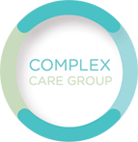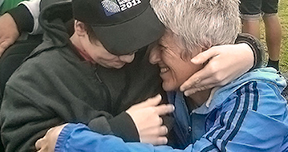
Your health and well-being
Caring for a child or young person with “high and complex” needs can indeed be very stressful. Caring for any child or young person can be stressful enough.
Your Health
I am sure that you have been told many times that you need to “take care of yourself; you’re no good to anyone if you don’t”. The analogy between the airline safety message about “putting on your own oxygen mask before assisting others” often comes up when discussing carers’ health.
In this day and age, I am sure that we are all very well aware of what we need to do to stay healthy. Every magazine or newspaper you pick up is bound to carry some article on health and wellbeing. The issue for us is often finding the time. Indeed time and space are two essentials for taking care of yourself and two aspects of our lives that can be very elusive.
Taking time out for yourself is so important. How easy it is to fill any spare time you may have from caring with all those essential things that need doing; doctors/ dentists appointments, shopping, cleaning, visiting mother? When did you last truly do something you really wanted to do, that you really enjoyed, just for you? I bet you felt guilty about it? Maybe even thought you were being selfish?
In order to even consider doing something for you, you first need to know that your children are safe and happy while you are doing it. When you are caring for someone who has intensive support needs this isn’t so easy to organise, but it is essential. You may be fortunate to have other family members who can manage really well when you’re not there. Alternatively you may have a really skilled support worker that you trust or your child/young person may be able to go to a suitable respite facility.
If you don’t have the opportunity to take a break regularly do talk to your NASC about what options you have (see NASC and services under SUPPORT). The CCG are aware of the difficulty of accessing skilled support and are consistently giving this message to Government agencies and Health Workforce NZ. Do contact us complexcarers@xtra.co.nz or 0800 852 693 (outside Auckland) or 443 5786 (in the Auckland area) if you want to discuss this topic further..
Stress
None of us can escape this problem. We hear that “some” stress is good for you, but the chronic ongoing stress that affects most of us can and no doubt will have detrimental effects on our health and wellbeing. Caring for someone can be stressful but many say having to continually fight for the rights of your child and sorting out the “system” takes an even bigger toll on our lives.
Common effects of stress
Stress symptoms can affect our body, thoughts, feelings and behaviour. By appreciating some of the common symptoms of stress we may be encouraged to try and do what we can to reduce them.
The following table is from the Mayo Clinic.
| Common effects of stress … | ||
| … On your body | … On your mood | … On your behaviour |
|
|
|
If you have stress symptoms, taking steps to manage your stress can have numerous health benefits. Stress management strategies that can be helpful are,
- Physical activity
- Relaxation techniques
- Meditation
- Yoga
- Tai chi
Plenty of sleep, eating a balanced diet and reducing alcohol, tobacco and caffeine intake will also help reduce stress related symptoms.
It all sounds so easy, but you still have to appreciate the need to prioritise stress management to make it happen.
Physical Activity
Some of you may already go regularly to the gym or at least walk/run for the 30minutes recommended at least three times a week. For those who don’t this may be a really good time to appreciate and think about the importance of physical exercise in reducing the effects of stress, prolonging your life and your ability to continue caring.
The Neurological Foundation of NZ now states that physical exercise is more important than cognitive exercise i.e. doing crosswords, in the prevention of brain disease such as strokes and dementia. All those lifestyle changes that we have been advised to adopt to ensure our heart stays healthy have now been found to be equally as important for our brain and psychological health.
Take note – multitasking has been found to be detrimental for your brain!
One of the main effects of chronic stress is the high levels of cortisol (the stress hormone) that is produced. Physical activity will help to reduce these levels and produce more endorphins (the feel good hormones).
You don’t have to go to the gym or run miles; you can “work out” in the garden or cleaning the house. Going for a walk along the beach, through a park or in the bush may appeal to you more. It doesn’t have to be for 30 minutes straight, you can break it up into manageable amounts if that works better for you. It has even been found that just keeping moving is beneficial, so when you are peeling the spuds or doing the dishes just keep moving your feet! You could get a skipping rope if you can’t leave the house and those stretchy bands that you can exercise with are great for strength training in case you don’t get enough in your caring role! Swimming can do wonders too.
Check out www.carersair.net.nz for their ActiveWellness programme and other ideas which may inspire you.
Relaxation
This can come in many forms and depends what your preference is. You may be lucky enough to be able to sit/lie down and “let go” and enjoy some relaxing time to yourself. You may like to listen to music, read, garden, enjoy time with friends.
Again it comes down to prioritising relaxation as being so very important. It is easy to feel guilty taking time out for yourself; of thinking of all those pressing things you should be doing. You will know however that when you have had a chance to truly relax or do something special for yourself, you do feel so much more able to cope with what needs to be done.
Being busy all the time makes it harder to “switch off”. You may find relaxation/meditation tapes helpful or may be able to attend a restorative yoga or Tai Chi class in your area. Having a massage can be very special and give you that “feel good” factor. Somehow you need to be able to turn off that constant chatter in your head!
Healthy Eating
We all know the importance of eating well and this may be one thing that you find easier than exercise and relaxation because you usually have to cook for the rest of the family anyway.
It is though so easy on some of those really tough days to justify having take aways or “rewarding yourself” with something sweet or an extra glass of wine. If that something is kept for those occasions it may well help to reduce those stress levels so don’t beat yourself up about it!
Plenty of fresh fruit and veggies are a must; preferably a variety of colours. Protein from lean meat, fish, eggs or tofu is really important for our muscle strength and repair. Grains and cereals provide energy and fibre. Oats in the form of porridge or muesli each morning is a great choice. For snacks during the day consider almonds, pumpkin or sunflower seeds; carrot and celery sticks with humus is another idea. We should have a couple of brazil nuts each day to provide the selenium we need as our soil in NZ is sadly depleted of this mineral. Oily fish such as salmon or sardines are also recommended for our omega 3 levels for brain and heart health. There are a number of fish oil supplements on the market which you may want to consider.
Water is of course of great importance. Straight from the tap is fine and very cost effective.
It is easy to turn to alcohol, tobacco and drugs when really stressed. Try and limit your intake of alcohol and quit using tobacco and drugs. There are a number of agencies that can help you do that.
Books, DVD’s Websites
There are numerous self help books, DVDs and websites available that may be of interest or inspire you. You can get books and DVDs from the library. Do let us know if there are any that you have found particularly helpful so we can share that information with others.
Regular Health Check-ups
It is really easy to put any symptoms you have down to stress. In fact the medical profession may see your caring role as the cause of many of your symptoms; it well maybe but it is important to be sure. An understanding GP is such an asset; someone you can talk to who will listen.
It is important to attend those appointments that you avoid by convincing yourself you don’t have time. Mammograms, smears, prostate checks, it doesn’t take much to find an excuse not to participate. What will you do, however, if later you find you have something major which could have been prevented if treated earlier. Do you have time for surgery, chemo, rehab ?
Sleep
Something we dream about! I am sure that we are all in deficit and appreciate the importance of getting as much as we can. Again it is important that you talk to your needs assessor or ACC case manager about your need to have some respite so you do have the opportunity to get some sleep. It is amazing how you can cope if you know you are going to have a regular break. Don’t let the situation escalate until you are totally burnt out and in crisis.
When to seek help
If you are feeling overwhelmed with life it is important that you talk to someone who will understand. You may have good friends and family members you can talk to, or your GP. If you don’t have this support, it is important that you make contact with someone.
You could call:
- Your NASC or ACC case manager
- Lifeline 0800 543 354
- Depression Helpline 0800 111 757 or www.depression.org.nz
- Healthline 0800 611 116
If you have reached the end of your tether and are at crisis point go to your local hospital or phone 111
ACC
42% of family carers in a recent survey had been injured while caring for their family member. Whether in your caring role, or if otherwise injured or if someone in your family is injured, ACC is there to assist you. ACC provides 24/7 injury cover to all New Zealanders.
If the person you support is already funded by ACC but has had a further injury, you can contact their case-manager if they require additional support/treatment.
It is important that you seek professional advice and get treatment as soon as possible if you injure yourself. Your GP, Emergency Department, Physiotherapist or other relevant health professional can complete an ACC claim form for you and ACC will contact you to let you know if your claim has been approved.
If approved ACC may contribute to the cost of ongoing treatment. They may pay for extra support at home when necessary for your personal care and home help. They may also provide for child care in some circumstances.
ACC has a Code of Claimants Rights for people receiving their services.
You have the right to:
- Be treated with dignity and respect
- Be treated fairly and have your views considered
- Have your culture, values and beliefs respected
- Have a support person/s
- Effective communication
- Be fully informed
- Have your privacy respected
- Make a complaint
If you feel your rights have been breached you can contact ACC at 0800 101 996 or at www.acc.co.nz
For information about programmes for health and wellbeing provided by ACC go to www.acc.co.nz
 Complex Care Group
Complex Care Group
